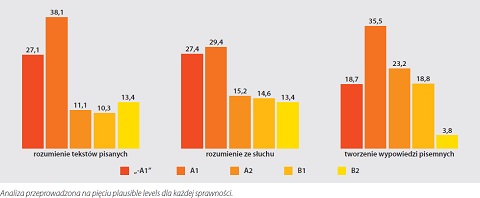Polish lower secondary school students foreign language skills are worse than their European peers'
- Published on Tuesday, 22 October 2013 02:36
Polish lower secondary school students foreign language competences are worse than those of their peers in Europe. This is the main conclusion of the European Survey on Language Competences carried out in 2011. IBE published the Polish country report of the ESLC study.
 ESLC in Poland: English and German
ESLC in Poland: English and German
The Europeans must increase their overall level of competence including knowledge of foreign languages – the Council of Europe decided on a summit meeting over a decade ago. The purpose of the ESLC study was to examine the situation by comparing young Europeans’ language competences.
The first ESCL assessment was carried out in 2011 and included 16 language communities from 14 countries. In Poland over 3 thousand third grade students of lower secondary schools participated in the study. The students were the last to be taught according to the old core curriculum. Therefore, the study presents the learning outcomes from before the 2009 reform which, among other things, introduced obligatory foreign language teaching into the first grade of primary school, obligatory course of the second foreign language into lower secondary schools and officially recommends grouping students in similar language level units rather than teaching them in traditional class system.
Polish students took part in English (first foreign language) and German (second foreign language) skills assessment.
How did they perform compared with 50 thousand peers from Europe?
The majority at A1 level
The study shows that the most commonly taught language in Europe is English. Almost 50% of young Europeans reach B1 or B2 levels as described in the Common European Framework of Reference for Languages (CEFR). In short, B1 level students demonstrate the ability to use a foreign language in simple, everyday situations, and B2 level - the ability to use a language effectively in more abstract contexts and hold a conversation with a native speaker without strain to either party.
In Poland, the majority of students in lower secondary schools do not go beyond A1 level - typical for beginners, limited to a narrow set of absolutely basic skills. Roughly, every third student at lower secondary school can only understand very short and easy texts containing simple expressions and comprehend an utterance spoken very slowly and carefully with long breaks. The writing skills are limited to simple expressions and sentences. The ESLC study showed that only every fifth Polish student at lower secondary school attempts to acquire skills at A2 level.
For learners of German the situation is even more pessimistic. Although about 40% of students at lower secondary school reach A1 level, the same percentage does not demonstrate skills typical for that level.
 The percentage of Polish students at particular CEFR levels in the three skills (English)
The percentage of Polish students at particular CEFR levels in the three skills (English)
Unsurprisingly the study showed clear relationships between the foreigh language competence and students’ place of residence. Students who live in towns of 20 - 100 thousand inhabitants do better in listening skills assessment and can write much better English than their counterparts in villages.
Also, students’ level of language skills in both tested languages increases with their parents’ professional position and socio-economic status.
There is, however, also a group of students whose language skills are much higher. Every fifth student in lower secondary schools who studies English reaches B1 or B2 level. Also every fifteenth student in lower secondary schools who studies German demonstartes similar level of language competence.
What factors facilitate foreign language acquisition?
The results of the ESLC study may serve as the basis for making several hypotheses on what improves language skills. Among those an early start has special prominence.
One of the most important factors influencing the level of foreign language skills among students is the foregin language proficency of their parents. It is particularly true for reading and listening skills. Unfortunately, the majority of Polish students say that their parents do not know any foreign language or their skills are very limited. Parents’ foreign language competence declared by students ranks among the lowest in Europe.
The study showed that students who intensively communicate in a foreign language during lessons demonstrate much higher competence.







